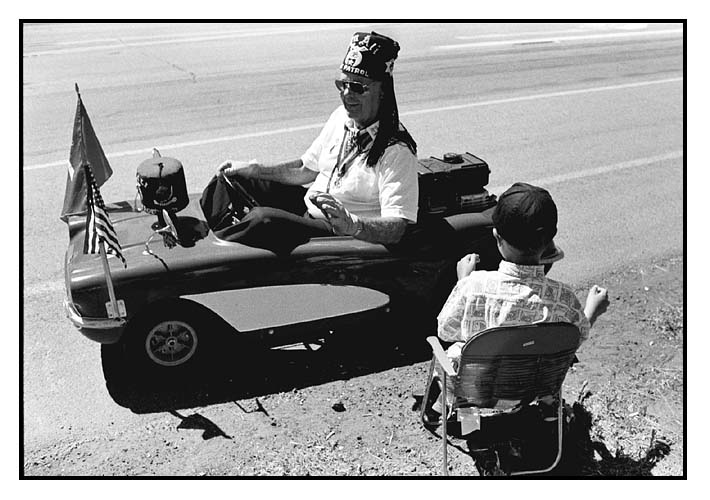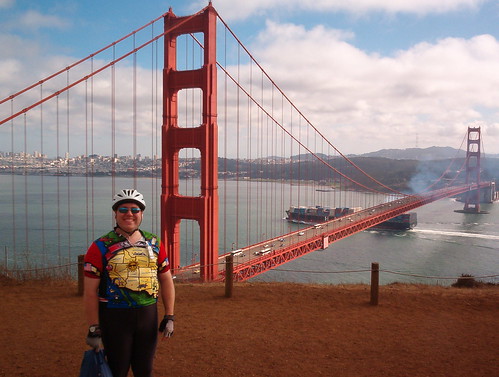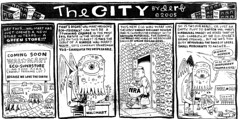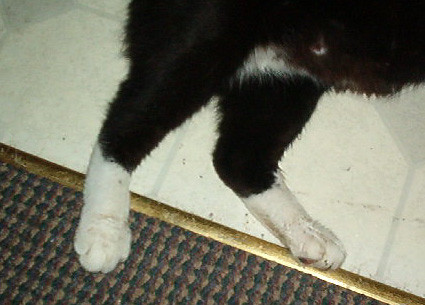
"A strange game, the only way to win is not to play."
...it fits on so many levels.
On one side, it means "Be concerned, yet detached."
on the other hand, it means "fuck it. I'm going home."
...and right now I'm somewhere in between.
...a mapmaker in Washington DC.


From Bush's November 30, 2005 speech at the US Naval Academy and Nixon's "Silent Majority" speech from November 3, 1969.
BUSH: "We will increasingly move out of Iraqi cities, reduce the number of bases from which we operate and conduct fewer patrols and convoys.
NIXON: "As South Vietnamese forces become stronger, the rate of American withdrawal can become greater."
BUSH: "As the Iraqi forces gain experience and the political progress advances, we will be able to decrease our troop levels in Iraq without losing our capability to defeat the terrorists."
NIXON: "We have adopted a plan which we have worked out in cooperation with the South Vietnamese for the complete withdrawal of all U.S. combat ground forces, and their replacement by South Vietnamese forces on an orderly scheduled timetable. This withdrawal will be made from strength and not from weakness."
BUSH: "These decisions about troop levels will be driven by the conditions on the ground in Iraq and the good judgment of our commanders, not by artificial timetables set by politicians in Washington. Some are calling for a deadline for withdrawal. Many advocating an artificial timetable for withdrawing our troops are sincere, but I believe they're sincerely wrong."
NIXON: "I have not and do not intend to announce the timetable for our program. And there are obvious reasons for this decision which I am sure you will understand. As I have indicated on several occasions, the rate of withdrawal will depend on developments on three fronts."
BUSH: "Pulling our troops out before they've achieved their purpose is not a plan for victory. As Democratic Senator Joe Lieberman said recently, "Setting an artificial timetable would discourage our troops because it seems to be heading for the door. It will encourage the terrorists. It will confuse the Iraqi people. Senator Lieberman is right: Setting an artificial deadline to withdraw would send a message across the world that America is weak and an unreliable ally."
NIXON: "An announcement of a fixed timetable for our withdrawal would completely remove any incentive for the enemy to negotiate an agreement. They would simply wait until our forces had withdrawn and then move in."
Though both Bush and Nixon reject setting a timetable for withdrawal, one group does want one set in stone: The Democratically Elected Iraqi Government.
...On November 22, 2005, the democratically-elected leaders and ruling body of the Iraqi people agreed on "calling for the withdrawal of foreign troops according to a timetable, through putting in place an immediate national program to rebuild the armed forces ... control the borders and the security situation"


You scored as Cultural Creative. Cultural Creatives are probably the newest group to enter this realm. You are a modern thinker who tends to shy away from organized religion but still feels as if there is something greater than ourselves. You are very spiritual, even if you are not religious. Life has a meaning outside of the rational.
What is Your World View? (updated) created with QuizFarm.com |
The Rev. George F. Regas did not urge parishioners at All Saints Episcopal Church in Pasadena to support either President Bush or John Kerry, but he was critical of the Iraq war and Bush's tax cuts.
The IRS warned the church in June that its tax-exempt status was in jeopardy because such organizations are prohibited from intervening in political campaigns and elections.
...so what the hell did the IRS consider 'Just Us' Sunday, 'Just US Sunday II', and 'Porn Sunday'? I mean, they even had congressmen, right-wing nutcase congressmen, as their guest speakers, whining and moaning about... politics!
A recent debate on the subject before council's law and criminal justice committee seemed to disregard why bicyclists prefer sidewalks on streets where the speed limit is above 35 mph.
Some adult bicyclists understandably feel their safety is jeopardized on streets that carry a lot of vehicular traffic. But city law only allows cyclists 14 and under to use sidewalks.
Councilman Ellen Grachek has proposed amending the law to permit older cyclists to also use sidewalks on such busy thoroughfares.
The idea springs from an adult cyclist's experience in July on Alexis Road. After the bike rider collided with a vehicle coming out of a driveway, he was slapped with a ticket and conviction, though he received no penalty.
He correctly notes that motorists today are more distracted, especially by cell phones. Motorists on the phone don't pay close attention to traffic in general, so they may not see bicyclists on busy streets.
At the same time, there are legitimate concerns about cyclists on sidewalks. Foremost among them: the worry that bicyclists could pose the same threat to pedestrians on sidewalks that cars and trucks represent to bikes on busy streets.
But there are ways to allow bikes on sidewalks and penalize careless operation. Bicyclists on sidewalks could be required to travel in the same direction as traffic, and motorists, not bicyclists, could have the right of way at intersections and driveways.
If youngsters are allowed to ride their bicycles on sidewalks, adults willing to do so responsibly should have the same right. Bikes don't belong on busy thoroughfares.




You Are Likely a First Born |
 At your darkest moments, you feel guilty. At work and school, you do best when you're researching. When you love someone, you tend to agree with them often. In friendship, you are considerate and compromising. Your ideal careers are: business, research, counseling, promotion, and speaking. You will leave your mark on the world with discoveries, new information, and teaching people to dream. |



| The Gerrymander, for those who never learned about it in US government class, goes was a congressional district drawn in 1812 by Mass. Gov. Elbridge Gerry to favor his party, as seen to the right. Today's gerrymandering is more subtle, but the practice is still alive and well. In 2003, Republicans in Texas redrew their congressional districts in a way that allowed them to pick up 5 seats. Passage of issue 4 would move our congressional districts out of the reach of partisan politics using the following rules: |  |
LORRIE BETH SLONSKY: Now it's day four and the hotels had completely run out of fuel for the generator and food and water. And sanitation, even in this very fancy hotel had become dangerously abysmal. And it seemed like our only choice was to go to the Convention Center. As we left the hotel, we came across the National Guard, and this is where they told us that we couldn't go to the Superdome nor the Convention Center, and they didn't have any suggestions where we should go, and they also said we should have gotten out there sooner. And no, they didn't have any food, and no, they didn't have any water to spare. And then the next thing we came across was the Police Command Center and this is at Harrods on Canal Street and we were told the same thing: that we are on our own, and they had no place to suggest where we should go, and they didn't have any food, but they did give us four small bottles of water to share among the probably 200 folks that had left the hotel and the downtown tourist type folks. That's what they had to give us was four small bottles of water to spare.
So, right across the street from this Police Command Center was this amphitheater type place and we thought the best thing to do is to go ahead and camp across the street from the Police Command Center. Because we thought, well, we would be visual to the media and we have some sort of a protection, and before we got too comfy, the Police Commander came up to us and said we needed to go to the bridge because they were going to be buses waiting there to take us out of the city. You know, this crowd of 200 that had left the hotel in the downtown area, we just let out a big old cheer, but Larry called everyone back and said to the police officer and to the folks that, you know, we have been given so much misinformation and was he sure there were buses? And I have to tell you, Amy, that he looked at us directly and he said, I swear to you that the buses are there.
So, we group of about 200 people, set off to the bridge, and I have to say, we must have looked like quite determined tourists with our little roll-top suitcases following behind us, and we passed near the Convention Center, and locals asked us where we were going. And we told them the great news, how the police commander said that there was going to be buses at the bridge, so you know, families grabbed their few belongs and we all started marching up towards the bridge. And our numbers doubled and probably doubled again. We were probably about 600, 700, 800 people. Just it seemed like a lot of people. So, it started to rain, and even though it started to pour down rain, we -- our -- it didn't dampen our spirits at all. We felt like, God, we have a way out of here on day four. And as we approached, there were armed Gretna deputies. And they had formed a line at foot of the bridge. And before we were even close enough to cross, they shot guns, they shot guns over our heads. They fired guns over our heads. And this group of families and, may I say, disabled people, children, tourists, I mean, just everyone, we just all scattered in all sorts of directions. And then everyone was in their own small little groups and milling around and what to do next.
And this is when Larry approached the Gretna deputies, and you know, he had his badge, his San Francisco Fire Department badge and had his hands up and asked if he could approach. And he was able to engage the deputies in some conversation. And Larry told them that we were told by the Police Command Post that we needed to come here to the bridge, because we we’re going to get on buses. And the deputy said that the Police Commander had apparently lied to us, and there were in fact no buses that were going to take us out of New Orleans. So, we asked the deputies, well, why couldn't we just cross the bridge anyway? And this is -- this is what we heard for the first time that the deputies had said to us, they said, this is not New Orleans, and there wasn't -- they were not going to have a Superdome over here, meaning, I guess in Gretna or Algiers or across the bridge. And I -- if you looked at the group that was remaining in our little group, I mean, you could only look at us and see that -- predominantly everyone was African-American or a person of color except for Larry, me, and the other gal we were with that it could only mean that if you are poor, or if you are black, you are not going to get out of New Orleans.
| by Kurt Vonnegut |
But back to people, like Confucius and Jesus and my son the doctor, Mark, who’ve said how we could behave more humanely, and maybe make the world a less painful place. One of my favorites is Eugene Debs, from Terre Haute in my native state of Indiana. Get a load of this:
Eugene Debs, who died back in 1926, when I was only 4, ran 5 times as the Socialist Party candidate for president, winning 900,000 votes, 6 percent of the popular vote, in 1912, if you can imagine such a ballot. He had this to say while campaigning:
As long as there is a lower class, I am in it.
As long as there is a criminal element, I’m of it.
As long as there is a soul in prison, I am not free.
Doesn’t anything socialistic make you want to throw up? Like great public schools or health insurance for all?
How about Jesus’ Sermon on the Mount, the Beatitudes?
Blessed are the meek, for they shall inherit the Earth.
Blessed are the merciful, for they shall obtain mercy.
Blessed are the peacemakers, for they shall be called the children of God. …
And so on.
Not exactly planks in a Republican platform. Not exactly Donald Rumsfeld or Dick Cheney stuff.
For some reason, the most vocal Christians among us never mention the Beatitudes. But, often with tears in their eyes, they demand that the Ten Commandments be posted in public buildings. And of course that’s Moses, not Jesus. I haven’t heard one of them demand that the Sermon on the Mount, the Beatitudes, be posted anywhere.
“Blessed are the merciful” in a courtroom? “Blessed are the peacemakers” in the Pentagon? Give me a break!
This just seemed woth repeating...
As mentioned during Kurt Vonnegut's appearance on The Daily Show last tuesday...
LIBERAL CRAP I NEVER WANT TO HEAR AGAIN
by Kurt Vonnegut
Give us this day our daily bread. Oh sure.
Forgive us our trespasses as we forgive those wh trespass against us.
Nobody better trespass against me. I'll tell you that.
Blessed are the meek.
Blessed are the merciful. You mean we can't use torture?
Blessed are the peacemakers. Jane Fonda?
Love your enemies - Arabs?
Ye cannot serve God and Mammon.
The hell I can't! Look at the Reverand Pat Robertson. And He is as happy as a pig in s**t.


 , an Indian grad student here at UT, sent me the following comparison between New Orleans and Mumbai (which , I should add, is on the west coast of India. You may know the city of Mumbai as Bombay.
, an Indian grad student here at UT, sent me the following comparison between New Orleans and Mumbai (which , I should add, is on the west coast of India. You may know the city of Mumbai as Bombay.



. | ||||||
| "In view of the developments since we first sent our troops to Iraq, do you think the United States made a mistake in sending troops to Iraq, or not?" Form A (N=481, MoE ± 5) | ||||||
. | ||||||
| Made a Mistake | Did Not Make a Mistake | Unsure | | | ||
| % | % | % | | | ||
| 8/5-7/05 | 54 | 44 | 2 | | | |
| 7/22-24/05 | 46 | 53 | 1 | | ||
"All in all, do you think it was worth going to war in Iraq, or not?" Form B (N=523, MoE ± 5) | ||||||
. | ||||||
| Worth Going To War | Not Worth Going To War | Unsure | | | ||
| % | % | % | | | ||
| 8/5-7/05 | 44 | 54 | 2 | | | |
| 7/7-10/05 | 44 | 53 | 3 | | ||
"In general, how would you say things are going for the U.S. in Iraq: very well, moderately well, moderately badly, or very badly?" Options rotated. N=1,004, MoE ± 3. | ||||||
. | ||||||
| Very Well | Moderately Well | Moderately Badly | Very Badly | Unsure | ||
| % | % | % | % | % | ||
| 8/5-7/05 | 5 | 38 | 28 | 28 | 1 | |
| 4/29 - 5/1/05 | 6 | 36 | 31 | 25 | 2 | |
"Which comes closest to your view about what the U.S. should now do about the number of U.S. troops in Iraq? The U.S. should send more troops to Iraq. The U.S. should keep the number of troops as it is now. The U.S. should withdraw some troops from Iraq. OR, The U.S. should withdraw all of its troops from Iraq." Options rotated. N=1,004, MoE ± 3. | ||||||
. | ||||||
| Send More | Same as Now | Withdraw Some | Withdraw All | Unsure | ||
| % | % | % | % | % | ||
| 8/5-7/05 | 13 | 28 | 23 | 33 | 3 | |
| 6/6-8/05 | 10 | 26 | 31 | 28 | 5 | |
"Do you think the war with Iraq has made the U.S. safer or less safe from terrorism?" Form A (N=481, MoE ± 5) | ||||||
. | ||||||
| Safer | Less Safe | No Change (vol.) | Unsure | | ||
| % | % | % | % | | ||
| 8/5-7/05 | 34 | 57 | 6 | 3 | | |
| 7/7-10/05 | 40 | 54 | 5 | 1 | | |
"Do you think the war with Iraq will make the U.S. safer or less safe from terrorism in the long run?" Form B (N=523, MoE ± 5) | ||||||
. | ||||||
| Safer | Less Safe | No Change (vol.) | Unsure | | ||
| % | % | % | % | | ||
| 8/5-7/05 | 42 | 48 | 8 | 2 | | |
